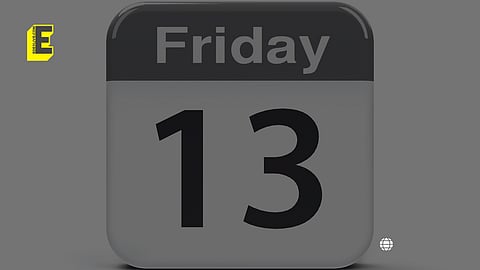

December 2024’s Second Friday is no ordinary one — it falls on the 13th!
Yes, you read that right! If you’re a fan of pop culture or mythology, the infamous 'Friday the 13th' date likely rings a bell. Known for its eerie reputation, this day is often associated with bad luck, superstitions, and spine-chilling stories. But why has this day sparked curiosity for centuries — and is it really as unlucky as people claim?
1. Why Is Friday the 13th considered unlucky?
The superstition surrounding Friday the 13th can be traced back to a mix of ancient cultural beliefs. First, 13 has long been viewed as an unlucky number. Many believe this is because it disrupts the "completeness" of 12 — think 12 months in a year, 12 zodiac signs, and 12 hours on a clock.
For a more biblical explanation, consider that Judas, who betrayed Jesus, was the 13th guest at the Last Supper. Meanwhile, Friday itself carries an air of bad luck in some cultures, particularly Christianity, where it is believed that Jesus was crucified on a Friday.
2. From where did the fear of Friday the 13th emerge?
While the fear surrounding the 13th date is often linked to Christianity and the Last Supper, its origins go deeper. In Norse mythology, Loki was the 13th guest at a dinner hosted by the Gods, and his presence led to chaos and mischief, ultimately plunging the world into darkness.
This superstition spread across cultures and was further popularised by pop culture, particularly through the famous Friday the 13th horror film series, which solidified the day’s ominous reputation worldwide.
Fun fact: The fear of Friday the 13th even has a name — paraskevidekatriaphobia!
3. Does Friday the 13th really bring bad luck?
Despite the widespread belief, there is no scientific evidence to suggest that Friday the 13th is any unluckier than any other day. However, due to deeply rooted superstitions and cultural beliefs, many people avoid making important decisions or travelling on this day. In fact, some buildings skip the 13th floor entirely!
4. What Is the significance of Friday the 13th in Indian culture?
While Western pop culture may paint Friday the 13th as a day of misfortune, in Indian culture, the number 13 is often considered lucky. In fact, it is associated with Lord Shiva, making it a symbol of transformation and power.
India also has its own set of superstitions regarding inauspicious days, with Tuesday and Saturday often regarded as more unlucky than Friday, especially when they fall on the 13th. For example, in Tamil Nadu and parts of Kerala, Tuesday the 13th is feared more, while Friday itself is seen as a day dedicated to Goddess Lakshmi, making it a time for new beginnings and worship.
5. How Often Does Friday the 13th Occur?
Friday the 13th occurs at least once a year, but it can happen up to three times within a single year. So, if this Friday the 13th has you feeling uneasy, just remember — it’s no different than any other Friday. You could even embrace superstition with a fun horror movie marathon to turn this day into something memorable!
